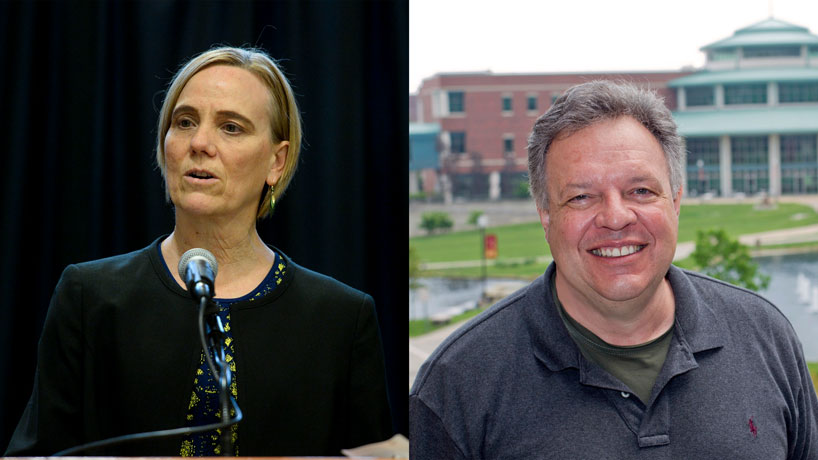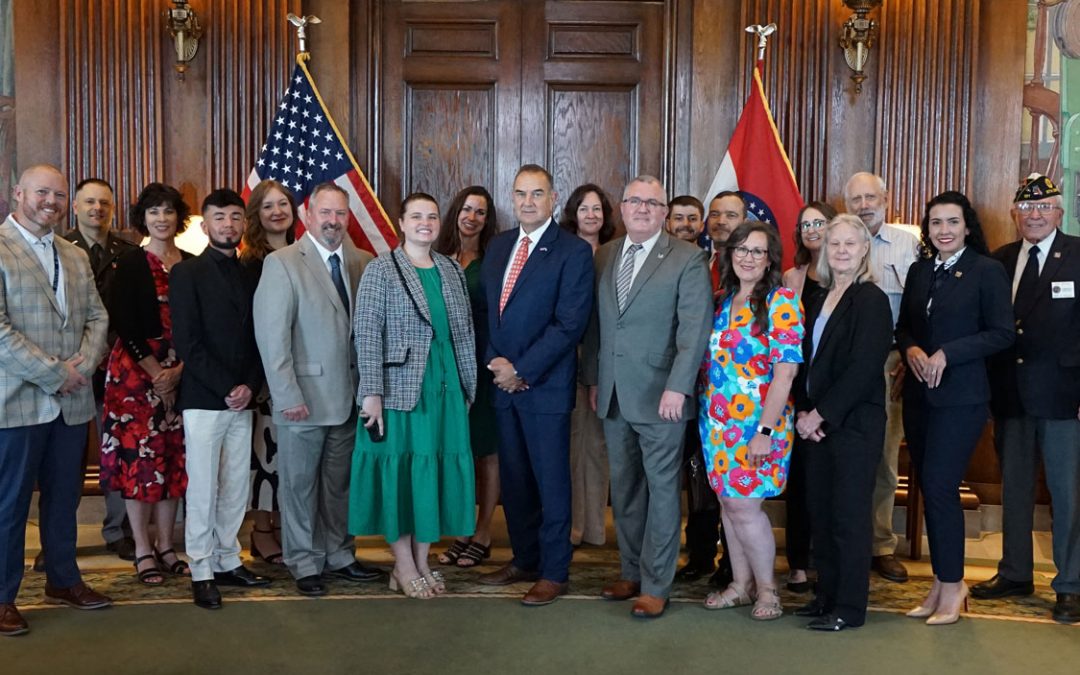
The Board of Curators of the University of Missouri recognized Professors Susan Brownell and Rocco Cottone, elevating them to the most prestigious ranks in the UM System. (Photos by August Jennewein)
Over the course of her career, University of Missouri–St. Louis Professor Susan Brownell has continually worked at the intersection of anthropology, athletics and China.
Brownell, who serves as a professor of anthropology in the Department of History, is an internationally recognized expert on Chinese sports, Olympic Games and World’s Fairs. Her field work has often taken place in China, particularly Beijing and Shanghai. In 2007, she was a Fulbright Senior Researcher at the Beijing Sport University, doing research on the Beijing Olympic Games, and has also conducted research at the Olympics in Athens, Rio de Janeiro and PyeongChang.
Rocco Cottone, professor of counseling and family therapy in the College of Education, is a renowned counselor who has previously been named a fellow by the American Counseling Association. He has published several books on counseling and psychotherapy, including “Paradigms of Counseling and Psychotherapy,” “Ethics and Decision Making in Counseling and Psychotherapy” and “Toward a Positive Psychology of Religion: Belief Science in the Postmodern Era.”
Taking into consideration their accomplishments and credentials, the Board of Curators of the University of Missouri this month approved the nominations of Brownell to be named Curators’ Distinguished Professor and Cottone to be named Curators’ Distinguished Professor Emeritus. Cottone was previously nominated as a Curators’ Distinguished Professor in 2020. Brownell’s appointment covers a period of five years but can be extended at the discretion of the chancellor.
Michael Williams, chair of the University of Missouri Board of Curators, said the strength of the UM System’s academic institutions hinges on the expertise of its outstanding faculty.
“It is always an honor to recognize our faculty with the highest and most prestigious rank awarded by the Board,” Williams said. “Their dedication to the university’s missions of education, research, service and economic development is paramount as we work constantly to create a better society.”
“These are prestigious appointments reserved only for outstanding scholars and teachers that are internationally recognized for their contributions,” University of Missouri System President Mun Choi said. “Their work elevates our understanding of the world around us and educates the next generation of leaders.”
Brownell said she feels grateful to join the ranks of the Curators’ Distinguished Professors.
“I have been at UMSL for 29 years, and our Curators’ Distinguished Professors were always an inspiration to me,” she said. “Two of them, Richard Wright in criminology and criminal justice and Joyce Mushaben in political science, were models and mentors who supported me in important ways and provided wise professional advice. In fact, it was Joyce who kept nagging me to ask my department chair to nominate me for the Curators’ Professorship. I am honored to follow in their footsteps, and I hope I can have a positive impact at UMSL and on younger faculty, as they did.”
Cottone was equally appreciative when he received the Curator’s Professorship in 2020.
“I am so honored by being named a Curators’ Distinguished Professor,” Cottone said. “As the first college graduate of my family, as the grandson of immigrants and as a native Missourian, I am so proud to have my work recognized by the University of Missouri Curators. So many people helped me along my academic journey – family, friends, teachers, colleagues and mentors – and I recognize their contribution to any accomplishments I claim. I want to thank them and honor them as I am honored by this award.”
Brownell’s interest in China and the Olympics both began early in life.
She traces her curiosity in China to hearing the stories her grandmother would tell about her great-grandfather Earl Brewer, the former Mississippi governor, who represented the Chinese community in the Mississippi Delta in a challenge to school segregation in the 1920s. The case, known as Gong Lum v. Rice, reached the U.S. Supreme Court, which denied the appeal and upheld the authority of Mississippi to segregate schools by race in 1927.
Brownell’s focus on the Olympics started as a promising young athlete. She was a nationally ranked track and field athlete at the University of Virginia, where she was studying anthropology as an undergraduate, and competed in the 1980 and 1984 Olympic trials. The 1980 Summer Games in Moscow proved to be a meaningful event at the crossroads of athletics and international relations, as the United States engaged in a full-scale boycott in the wake of the Soviet Union’s invasion of Afghanistan in December of 1979.
After earning her bachelor’s degree, Brownell was among the early wave of researchers to visit China and conduct ethnographic research in the 1980s while pursuing her PhD at the University of California, Santa Barbara. She spent the 1985-86 academic year at Beijing Sport University studying Chinese language and competing on the school’s track team. She represented the university in the 1986 Chinese National College Games and set a national record in the heptathlon.
Brownell returned to Beijing Sport University for a year of doctoral research in 1987 and has made numerous trips to the country to conduct research since joining the UMSL faculty in 1984.
Since that time, she’s become internationally recognized for her research, authoring books such as “Training the Body for China: Sports in the Moral Order of the People’s Republic,” “Beijing’s Games: What the Olympics Mean to China” and “The Anthropology of Sport: Bodies, Borders, Biopolitics” and co-editing “The Olympics in East Asia: Nationalism, Regionalism, and Globalism on the Center Stage of World Sports.”
Brownell has also become an ambassador for American-Chinese relations. Early this year, she joined the National Committee on U.S.-China Relations. She’s often noted the role sports play in connecting people from all walks of life, as well as different cultures.
“I believe that the larger function of the Olympics in global society is to provide a global ritual that reaffirms to a huge global audience the commitment between nations to mutual respect and world peace,” Brownell said. “While I’m not oblivious to the criticism of the commercialization and expense of the Games, I wish the critics were able to step back and look at the larger picture of their symbolic and ceremonial function. More heads of state and CEOs of major corporations attend the opening ceremony of the Summer Games than attend any other event; they constitute history’s largest diplomatic gatherings. I sometimes feel that I am one of the few people in the world who has done the research and understands this. So, I am passionate about this research, and about describing the ways in which hosting Olympic Games has facilitated China’s integration into the community of nations.”
Looking back at her many accomplishments, Brownell is proud that she’s been a consistent advocate of relations between the U.S. and China.
“My goal has always been to act as a cultural bridge between China and the U.S. and to do my part to ensure that the two countries never go to war by increasing mutual understanding,” she said. “That’s important not just for me but for everyone across the globe. While the current downturn in U.S.-China relations is very disheartening, I can at least look back on my career and know that I gave it my best effort. I have interacted with hundreds if not thousands of Chinese people from every walk of life. I have had the opportunity to represent America in face-to-face interactions with people who never had the opportunity to speak to a person with a European face using their own language. I have seen the powerful impact this has on people and have always taken the responsibility of representing America seriously.”














